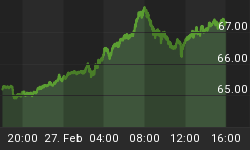Earlier this year, and based upon the observation that his administration had inherited a $1.3 trillion budget deficit, President Obama pledged to cut the budget deficit in half. Mr. Obama also talked tough about reining in the deficit longer-term:
"We are paying the price for these deficits right now," Mr. Obama said, estimating the country spends $250 billion - one in every ten dollars of taxpayer money - in interest on the national debt. "I refuse to leave our children with a debt that they cannot repay." CBS News
While none of Mr. Obama's bailout/stimulus policies have been focused on budget deficit containment, this appeared to be changing last week when Obama called for budget cuts and pledged that his actions would "start setting a tone" in Washington. However, when the President unveiled that he was initially gunning for a mere $100 million in cuts it was difficult not to laugh. After all, and as Bloomberg recently noted, $100 million "would cut this year's projected deficit by about 0.006 percent". Since taking office the deficit has jumped by more than $500 billion, and President Obama feels it necessary to publicly state that he has asked his Cabinet chiefs to take the next 90-days to claw-out $100 million in cuts?
While Obama has not been eager to reiterate the ridiculous $100 million figure, he has, to his credit, continued to discuss budgetary restraint. On the surface Obama appears to genuinely care about the future of the U.S., and he understands that he must eventually take drastic measures to curtail what many prominent economists are concluding will be 'trillion dollar annual deficits' (on average) over the next decade (PDF File).
"All across America, families are tightening their belts and making hard choices. Now, Washington must show that same sense of responsibility....We cannot sustain deficits that mortgage our children's future, nor tolerate wasteful inefficiency...Government has a responsibility to spend the peoples' money wisely, and to serve the people effectively." Bloomberg
But below the surface there could be other forces compelling Obama to focus on the ballooning deficit. To be sure, by loosely pledging to abide by a 'pay-go' doctrine and cutting a little fat off his originally very fat budgetary plans, Obama could simply be attempting to appease the budget hawks and get his budget passed. Also, and more ominously, with China and others - those that support the U.S. debt machine - now openly suggesting that a new global currency (other than just USD) is required, Obama may be reacting to the fact that decades of fiscal carelessness is not likely be met with blind obedience in the future.
Whatever his compulsion for focusing on the budget deficit, it is clear that President Obama is faced with the seemingly impossible task of trying to stimulate economic activity and make good on an array of campaign pledges, while at the same time curtailing government excess. Quite frankly, whether it is healthcare reform, or the creation (or stopping the destruction) of jobs, many promises put forth by President Obama threaten to seriously contradict any further budget deficit pledges. In other words, continue to expect vague deficit promises and - eventually - some creative government accounting if the future turns out to be less optimistic than the Obama administration believes (See CBO versus Obama Administration fiscal projections).
In short, if current trends persist in the coming decades, Social Security and Medicare will consume the entire U.S. budget and, according to the CBO, the cost of simply servicing U.S. debt (if interest rates remain low) will hit almost $500 billion as early as 2019. While many other ominous statistics can be highlighted these two will suffice because they clearly demonstrate how unsustainable and dire the U.S. debt churn could become. Needless to say, the investor would do well to remember that many of the parties that continue to fund the U.S. debt party are openly starting to cheer 'yes we can' when it comes to getting off the dollar. These cheers are mounting because the consequences of staying with the dollar are beginning to overshadow the consequences of abandoning it - although exports would likely be trounced if a country like China stopped buying U.S. Treasuries, current trends suggest that there are as many dangers associated with holding large piles of a potentially depreciating reserve asset.
While no one can be sure exactly when the era of U.S. dollar hegemony will end, rest assured that when it does the budget choices in front of President Obama or his successor will have been made for them. When and if this day arrives the budgetary debate will turn into a budgetary diktat.















